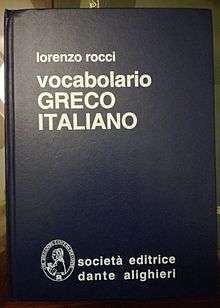Instruction in Ancient Greek
Ancient Greek language is still taught in some parts of the world. One of the very few schooling systems where Ancient Greek is still a compulsory subject, is Italy. Ancient Greek is usually treated as a written language in formal instruction.

Curriculum requirements in Europe
Italy
In Italy, Ancient Greek is a compulsory subject only for liceo classico schools students. Students of different Italian schools aren't required to study Ancient Greek. Since liceo classico students amount to 6.7 percent of Italian high school students, it can be concluded that about 6.7 percent of Italian students actually study Ancient Greek.[1]
Inside liceo classico, Ancient Greek courses last for the whole high school five-year study period, and, together with Latin it takes up a significant amount of time and effort to students. During the first two years of high school, students study, among other things, the grammar of both Latin and Ancient Greek, while in the remaining three years are mostly devoted to Latin literature and Ancient Greek literature.
In Italy, Ancient Greek, together with Latin, is deemed to be highly educative for students. Those languages are believed to provide a successful study method and to "open one's mind" (Italian: aprire la mente, as it is said), which means to make the students more skilled and willing to study, and also to significantly improve language skills, and it is deemed to improve the student's skills not only in the field of humanities, but in any field. Students who study Ancient Greek and Latin are said to perform better than other students both at university and in their career, but there is no conclusive statistical evidence for it. Italian liceo classico students are required to translate short texts from Ancient Greek ( the so-called Italian: versione di greco) and Latin almost on a daily basis, and it takes up a considerable amount of the time spent by students for homework.[2]
In Italy, the compulsory study of Ancient Greek have been both praised and criticized. It has been suggested that Italian schooling system should be revised to meet the international modern education standards, but very little has changed inside Italian schools when the study of Ancient Greek and Latin are considered.[3][4]
Italian physicist Guido Tonelli also attended liceo classico high school, and he said that the translation of short texts from Ancient Greek and Latin is comparable to "scientific research"; it's also supposed to be a useful mental exercise.[5]
Some Italian newspapers also praised Mark Zuckerberg and Bill Gates because they had studied Latin and Ancient Greek at high school, and some newspapers even claimed that this was the key to their success. According to the sources, without the knowledge of these disciplines they would have been "underpaid employees". Other sources, however, pointed out that Mark Zuckerberg was very clever on his own, he had studied in elite institutions, he also knew Hebrew and other ancient and modern languages, and he had knowledge in various fields. Moreover, it is unclear how many hours Zuckerberg and Gates actually devoted to these subjects, perhaps only a small part compared to the significant amount of weekly periods required by Italian liceo classico schools. Last but not least, other successful entrepreneurs, such as Steve Jobs, did not know Latin and Ancient Greek. [3]
See also
References
- "Iscrizioni 2018-2019, licei ancora in crescita: li sceglie il 55,3% dei ragazzi. Tutti i numeri - Tecnica della Scuola". 7 February 2018.
- "Perché non difendo il liceo classico (così com'è) • Le parole e le cose". www.leparoleelecose.it.
- "Zuckerberg è cosi ricco perché ha studiato latino ... o no?". noisefromamerika.
- "Fine del classico come metonimia".
- "Perché non difendo il liceo classico (così com'è) • Le parole e le cose". www.leparoleelecose.it.